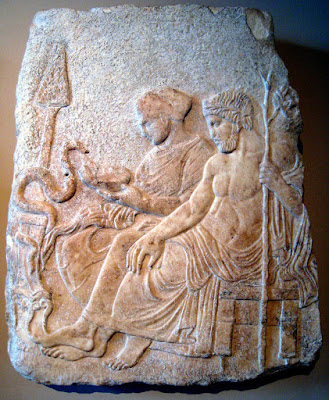By chance I happened to look at Pindar's Third Pythian Ode the other day, and realized it offers the opportunity to see how a Greek poet -- indeed, their greatest lyric poet -- handled some of the same material Ovid has been weaving together in books 2 and 3 of the Metamorphoses.
Like lightning, Pindar's words to the tyrant Hieron of Syracuse illuminate the torrent of myth:
A few updates:
More from Pindar on this story can be found here:
https://sententiaeantiquae.com/2016/04/27/koronis-death-and-the-birth-of-asclepius/
https://sententiaeantiquae.com/2016/07/30/koronis-death-and-the-birth-of-asclepius-2/
See also:
https://sententiaeantiquae.com/2016/04/25/asclepius-two-mothers/
And also the expression "nail the eyes of crows," which according to Sententiae Antiquae, was "a proverbial expression, which meant in effect that you could beat someone at their own game."
Pindar was claimed by Thebes, and Books 3 and 4 of the Metamorphoses are concerned with the Theban cycle. So admired was he that when Alexander the Great reduced Thebes to rubble, he made an exception of Pindar's house. Perhaps the conqueror was hoping that Pindar's spirit would return to sing of his conquests - after all, according to legend, that spirit did return after his death to share some verses about Persephone with a relative.
Horace defined the way admirers of the Greek poet have seen him ever since:
Julus, whoever tries to rival Pindar,
Flutters on wings of wax, a rude contriver
Doomed like the son of Daedalus to christen
Somewhere a shining sea.
A river bursts its banks and rushes down a
Mountain with uncontrollable momentum,
Rain-saturated, churning, chanting thunder –
There you have Pindar's style...
Anyway, in the Third Pythian, Pindar interweaves the tale of Apollo and Coronis with those of Cadmus and Harmonia, Chiron and Aesclepius, Semele and Dionysus, and even Achilles' parents, Peleus and Thetis:
But she made light of Apollo, in the error of her mind, and consented to another marriage without her father's knowledge, although she had before lain with Phoebus of the unshorn hair, [15] and was bearing within her the pure seed of the god. She did not wait for the marriage-feast to come, nor for the full-voiced cry of the hymenaeal chorus, such things as unmarried girls her own age love to murmur in evening songs to their companion. Instead, [20] she was in love with what was distant; many others have felt that passion. There is a worthless tribe among men which dishonors what is at home and looks far away, hunting down empty air with hopes that cannot be fulfilled. Such was the strong infatuation [25] that the spirit of lovely-robed Coronis had caught. For she lay in the bed of a stranger who came from Arcadia; but she did not elude the watcher. Even in Pytho where sheep are sacrificed, the king of the temple happened to perceive it, Loxias, persuading his thoughts with his unerring counsellor: his mind, which knows all things. He does not grasp falsehood, and he is deceived [30] by neither god nor man, neither in deeds nor in thoughts. Knowing even then of her sleeping with Ischys, son of Elatus, and of her lawless deceit, he sent his sister, raging with irresistible force, to Lacereia, since the girl lived by the banks of Lake Boebias. [35] A contrary fortune turned her to evil and overcame her. And many neighbors shared her fate and perished with her; fire leaps from a single spark on a mountain, and destroys a great forest. But when her kinsmen had placed the girl in the wooden walls of the pyre, and [40] the ravening flame of Hephaestus ran around it, then Apollo spoke: “I can no longer endure in my soul to destroy my own child by a most pitiful death, together with his mother's grievous suffering.” So he spoke. In one step he reached the child and snatched it from the corpse; the burning fire divided its blaze for him, [45] and he bore the child away and gave him to the Magnesian Centaur to teach him to heal many painful diseases for men.The doomed house of Thebes, from Cadmus to Pentheus to Laius to Oedipus, hangs over the poet's ruminations:
But a secure life was not granted either to Peleus son of Aeacus or to godlike Cadmus; yet they are said to have attained the highest prosperity of all mortal men, since [90] they heard the Muses of the golden headbands singing on the mountain and in seven-gatedThebes, when Cadmus married ox-eyed Harmonia, and Peleus married the famous daughter of wise Nereus.
Do not crave immortal life, my soul, but use to the full the resources of what is possible.
A few updates:
More from Pindar on this story can be found here:
https://sententiaeantiquae.com/2016/04/27/koronis-death-and-the-birth-of-asclepius/
https://sententiaeantiquae.com/2016/07/30/koronis-death-and-the-birth-of-asclepius-2/
See also:
https://sententiaeantiquae.com/2016/04/25/asclepius-two-mothers/
And also the expression "nail the eyes of crows," which according to Sententiae Antiquae, was "a proverbial expression, which meant in effect that you could beat someone at their own game."
 |
| Birth of Asclepius death of Coronis |
